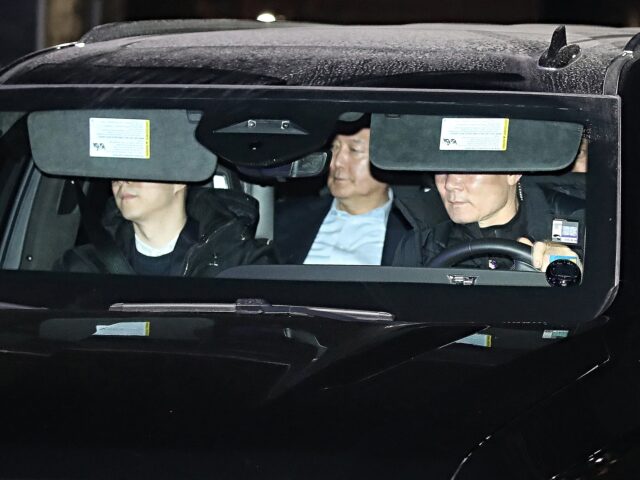South Korean law enforcement officials arrested impeached President Yoon Suk-yeol on Wednesday, executing a warrant Yoon and his attorneys condemned as illegal.
Yoon is facing criminal charges of insurrection and abuse of power – crimes exempt from executive immunity – as a result of his failed attempt to impose martial law on the country in early December. Yoon, a conservative, claimed in a national address that imposing military rule was necessary to stop legislative obstructionism by the leftist Democratic Party in the National Assembly.
The disastrous martial law declaration lasted mere hours after National Assembly lawmakers stormed the legislative chambers to vote against it, barreling through heavily armed soldiers deployed to stop them from convening. Political activities are illegal under martial law.
The Democrats, who hold the majority in the National Assembly, impeached Yoon and then impeached his temporary replacement, interim President Han Duck-soo. The second impeachment appeared to galvanize conservatives who had otherwise hesitated to support Yoon, prompting thousands to protest in freezing temperatures demanding an end to the impeachment.
Following the impeachment, Yoon is suspended from presidential duties but not removed from office until the Constitutional Court rules to affirm his ouster. The Court has 180 days from the date of the impeachment vote, December 14, to rule on the matter. It began its hearings on Tuesday, cutting the first hearing short because Yoon decided not to attend.
On Wednesday morning, officials with the Corruption Investigation Office for High-ranking Officials (CIO), tasked with the Yoon criminal case, detained the president at his official residence. The arrest was the first of a sitting president in the history of South Korea.
The detention on Wednesday occurred as Yoon supporters attempted to surround the presidential compound to protect him from being taken away. Throngs of protesters – some waving South Korean flags, others holding up signs implying that the Chinese Communist Party was behind the impeachment and criminal proceedings – convened in the heart of Seoul around the presidential resident, complicating police action.
Local media reported some minor clashes between police and protesters but no outsized violence.
The successful arrest on Wednesday was the second time that the CIO attempted to detain the president. The first occurred on Friday and failed as members of the Presidential Security Service (PSS) blocked the arrest, alongside the military. PSS leaders, and Yoon’s team, argue that executing a warrant at the presidential residence is illegal because the residence is a sensitive national security site and houses military secrets that could be exposed in police action.
PSS and CIO officers endured a standoff for nearly six hours before the CIO retreated, declaring the arrest impossible.
The national police, PSS, and CIO held a meeting on Tuesday in anticipation of Wednesday’s arrest to deconflict – reportedly at the behest of the police, whose officers were caught in between the PSS and CIO during the initial failed arrest attempt. PSS officials reportedly said after the meeting that they still disapproved of the arrest, but did not prevent the arrest on Wednesday.
“Unlike during the first attempt, there were no personnel or Presidential Security Service (PSS) staff actively resisting the execution,” an unnamed CIS official told reporters, according to the South Korean news service Yonhap. “There were practically no physical clashes today.”
Yonhap reported that the PSS only intervened by preventing the officials from entering the residence through the front door. As a result, CIS officials had to use ladders to ender the residence.
Yoon’s team published a video of the president shortly after his arrest, apparently recorded to be released in the event of his detention. In the message, Yoon called his arrest illegal and declared that the rule of law “has completed collapsed” in South Korea.
“Seeing warrants being issued by agencies without investigative authority, and courts without the authority to review warrants issuing arrest warrants and search and seizure warrants,” Yoon said, “and seeing investigative agencies issuing false official documents to deceive the people, committing such illegal acts, and forcibly proceeding with procedures based on invalid warrants, I cannot help but feel regretful.”
Yoon asserted that he did not comply with the arrest warrant because he believed it was legitimate, but to avoid “bloodshed.”
“In order to prevent an unpleasant bloodshed, I decided to appear before the Corruption Investigation Office for the time being, even though it is an illegal investigation,” he explained. “As the president who must protect the Constitution and legal system of the Republic of Korea, responding to such illegal and invalid procedures is not an acknowledgment of this [their legality], but rather a desire to prevent unpleasant bloodshed.”
He concluded by saying that the protesters outside his home made him “hopeful” for the future.
Constitutional Court proceedings are scheduled to resume on Thursday. Given his detention, South Korean media outlets expect Yoon to be present for these, in addition to participating in investigative interviews throughout the near future.

COMMENTS
Please let us know if you're having issues with commenting.